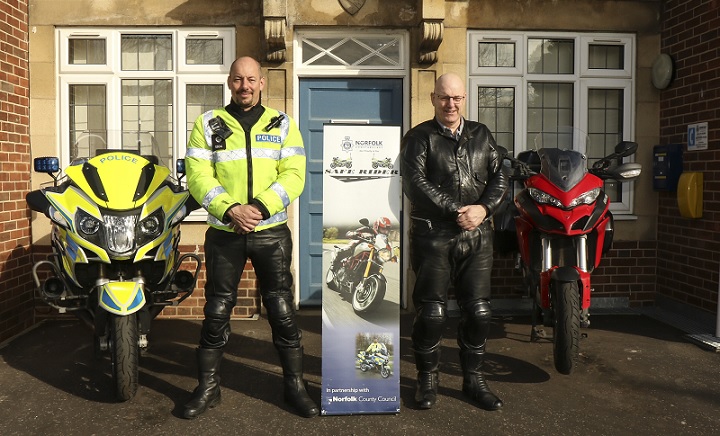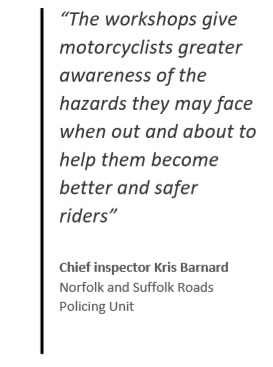
Norfolk Police and Norfolk County Council’s road safety team are celebrating the 20th anniversary of the Safe Rider training course, which has been delivered to more than 3,000 riders.
Safe Rider runs from April to October and comprises a ‘relaxed and informal’ two-and-a-half hour evening workshop followed by a five-hour road session. The course is aimed at fully qualified riders (either full A or A2 categories) who want to improve their skills to become better and safer riders.
In a ‘conflict free environment’, riders are introduced to the police Road Craft system, the ‘cornerstone of police riding’.
 The workshop provides individuals with professional advice and confirms their strengths and identifies their weaknesses as a rider.
The workshop provides individuals with professional advice and confirms their strengths and identifies their weaknesses as a rider.
The road session includes a demonstration ride by a police rider and an opportunity for the participant to have their riding assessed with written feedback – with options for further skills enhancement outlined at the conclusion of the course.
Norfolk Police says that in 1998 when Safe Rider was first introduced, 17 motorcyclists were killed – and a further 139 seriously injured – on the county’s roads. In 2017, six motorcyclists were killed and 101 seriously injured.
Despite these reductions, Norfolk Police says motorcyclists still represent a big proportion of all KSI casualties. Statistics show that between 2013 and 2017, riders represented 26% of all KSIs.
Chief inspector Kris Barnard, head of the Norfolk and Suffolk Roads Policing Unit, said: “Reducing the number of people who are killed or seriously injured on the county’s roads remains a priority for us and sadly the statistics speak for themselves that each year a high percentage of those killed on our roads are motorcyclists.
“The underlying message of the workshops is that education is key, not enforcement.
“The workshops give motorcyclists greater awareness of the hazards they may face when out and about to help them become better and safer riders.”
Good stuff. Sounds a lot like ‘Bikesafe’ by another name. As it is a 20th Anniversary, perhaps Norfolk were there first?
Pat, Wales
0
I don’t see how this is putting “education before enforcement”. Its just a different initiative. The fact that its education being done partly an enforcement agency is interesting but surely Norfolk Police haven’t abandoned enforcement have they?
Rod King, Warrington
--1
Unfortunately we have not seen very positive results of those two manoeuvres as they still statistically represent a fair proportion of incidents on our country roads. There are still a lot of motorcyclists suffering on them unnecessarily. It is obvious that motorcyclists are not riding safely when overtaking perhaps unnecessarily or on their mental and physical approach to bends.
Perhaps we need a new strategy and look at these two specifically with a view to reducing there impact on our riders. To perhaps look again at training for overtakes and possibly also engineering for bends.
Bob Craven
+1
It seems to me that some statistical progress has been made and I wonder just how many of those individuals that have undergone training have actually suffered an accident since training. Does anyone know? I would presume that possibly some have but the vast remainder are outsiders that have not undertaken any further instructions at all. Shame that.
However if the training is following the Roadcraft Model then in the main it would be quite safe but many accidents, especially fatal or near fatal ones are as a result of actions out there on our country roads. They are in the main on overtakes or what is considered inappropriate ones and others on bends. It seems to me that much of the training done on our country roads, arterial or otherwise unclassified, by the police or other Advanced riding training bodies do fundamentally concentrate their training with those two problems as they are recognised as the most frequently dangerous.
Bob Craven
+1